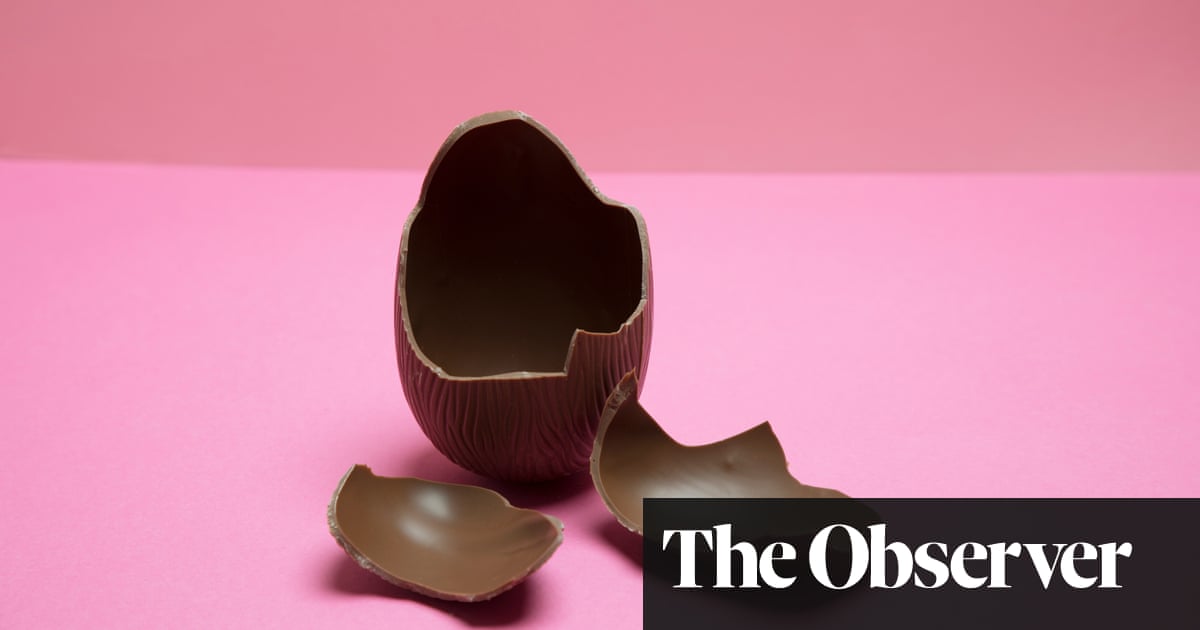
Every Easter, UK consumers collectively spend more than £1bn on food, drink, gifts, entertainment and about 80m chocolate eggs, racking up an average bill exceeding £50 each. But shoppers this year are paying more than usual: since last Easter, chocolate prices have increased by more than 12.6%, more than double the rise in supermarket food and drink prices.
The cost of cocoa, chocolate’s main ingredient, has been increasing all year, hitting a record high just before Valentine’s Day and again this week, when it was priced at more than $10,000 a tonne – meaning it is currently more valuable than several precious metals, and growing in value more quickly than bitcoin.
Increasing costs stem from a cocoa shortage in west Africa, in particular Ghana and Ivory Coast, where more than half of the world’s cocoa beans are harvested. According to experts, the shortage is explained by interconnected factors including climate-related weather events and exploitation inherent in the cocoa industry. It has come at a time of increased global demand, also contributing to scarcity and subsequent price rises.
“The [agricultural] challenges include various pests and diseases of cocoa, ageing trees on many farms, declining soil fertility and more variable and extreme weather events resulting from climate change,” said Dr Andrew Damyond of the School of Agriculture, Policy and Development at the University of Reading.
“The El Niño event of the past year has meant the rainy season in west Africa has been wetter than usual, which likely contributed to greater losses of cocoa pods to pod rot in west Africa,” he said.
“Whether or not the shortfall will continue in the coming months or years is very difficult to predict. However, with more frequent extreme weather events, there is likely to be greater year-to-year fluctuations in cocoa farm yields.”
Other factors believed to contribute to the shortage include the rising price of fertilisers, deforestation and illegal mining practices that degrade land.
Price increases mainly affect manufacturers buying commodity cocoa, used in almost all mass-produced chocolate products. But even for craft chocolatiers in the UK, many of whom already pay and charge more for high quality and ethically sourced ingredients, the ripple effects are being felt.
“This has been a nightmare waiting to happen,” said Amarachi Clarke, founder of the London-based chocolate brand Lucocoa. “When we talk about chocolate, how often do you hear the words ‘climate change’ or ‘living income’ or ‘lack of investment’? But all these things are starting to come to a head now, and we’ve got a huge problem.
“These are related issues because the majority of our chocolate comes from a small number of massive cocoa-processing companies which have gotten away with not paying farmers a living income, despite increased demand.
“If you’re not paying a farmer properly, they can’t afford to respond to climate change by investing in land, planting new crops or taking care of their plants, and you also get layers of slave and child labour.”
Lucocoa is still recovering from Covid-related loss of income and rising energy prices, as well as higher costs and lead times associated with Brexit, said Clarke.
“At some point, these rises will hit us too, and it does make you think: where does that leave us? How long have we got?” she said. “But the glimmer of light is maybe people will start to see what’s going on, and consumers might start to become more aware of these important issues.”
Some bigger brands also agree. Douglas Lamont, CEO of Netherlands-based Tony’s Chocolonely, founded in 2005 with the mission of eliminating exploitation in the chocolate supply chain, told the Observer the company supported higher costs if it means more money going to farmers.
“[But] high prices on the cocoa trading market don’t necessarily mean higher prices paid to cocoa farmers, and there are devastating consequences, like 1.5 million children working illegally on cocoa farms,” Lamont said. “What is happening on the cocoa market is not what is happening in farmers’ realities.”
Dr Michael Odijie, who has been researching cocoa farming conditions in west Africa at University College London, said a historic focus on keeping consumer prices low had contributed to long-term exploitation.
“I believe chocolate products are too cheap, resulting in cocoa farmers not earning enough to sustainably cultivate cocoa. Many problems in cocoa farming stem from this, including child labour and child trafficking as well as unsustainable cultivation methods,” he said.
“Farmers are not earning a living wage, all because chocolate manufacturers desire to keep chocolate cheap for consumers. There is enough research to demonstrate that, in a way, chocolate is being subsidised by the children of west Africa.”
Source: theguardian.com


















